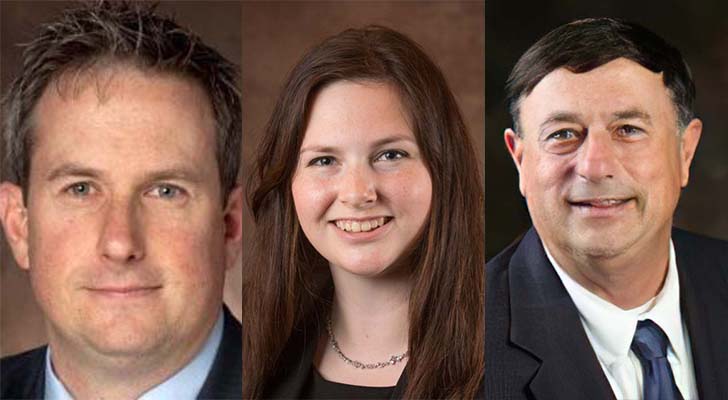Three generations of FSB professor's family co-author accountancy case study


If you haven’t heard of W.T. Grant, it’s not a big surprise. Started in 1906, the mass-merchandise chain was mainly located in the Northeast, with their stores often found in cities’ downtown areas. It briefly achieved greater notoriety for a series of business decisions in the early and mid-1970s that led to the company’s demise in 1976.
Farmer School accountancy professor Dan Heitger can tell you a lot about W.T. Grant, thanks to executive educations programs he worked on in the early 2000s with his father, Les, an accountancy professor at Missouri State University. “One of the things that Dad had always used was an excerpt from the Wall Street Journal about this company that went bankrupt in the late 1970s because of its horrendous incentive and management control system. We used that with executives and they understood what it meant and how important it was. And then we wrote up a little casual case for classroom use with undergraduates over the years and used it successfully,” Dan said.
“But to the students, that was a lifetime ago, a different world. Now we have lawyers and social media and they’d have these excuses and say ‘I really don't think that would happen again.’ And we would just chuckle about that at night,” Dan said.
But then in 2016, Wells Fargo became embroiled in a scandal involving millions of fraudulent savings and checking accounts created on behalf of clients – a significant failure of management control systems. “The fact that Wells Fargo was probably the most respected financial institution in the world, one of the top corporations in the world, students when they heard about what had happened, they had to think, ‘Well, wait a minute. If it could happen at Wells Fargo, it can happen anywhere,” Les explained.
“It was just fascinating because the same thing happened almost 50 years later in a current industry, in the current times, with all the lawyers and internet that students had mentioned, and it just seemed like we had to sit down and write this case,” Dan said.
“It was a case that not only showed the continuing reason why management control systems -- what you report, what you measure, what you reward -- are at the heart of how well organizations meet their objectives, whatever they are,” he said. “One of the things that I have learned from teaching management accounting courses is that one of the really challenging things is not only to convince students that management accounting is important, but to explain why it's important.”
They also decided to get some assistance from one of the newest generation of accountancy students – Allyson Heitger, Dan’s daughter and Les’ granddaughter, who just finished her time at Miami in the spring.
“I helped analyze the pilot data from undergraduate classes, as well as MBA classes, graduate or masters of accountancy classes. So each time this case was piloted in its different iterations, students filled out a voluntary and anonymous survey of what they thought about the case and its application to the real world,” Allyson remarked. “I helped analyze that data each time to prove the efficacy of the case, and then also provide feedback on the case itself, a kind of student's perspective and a reader's perspective, to make it more interesting.”
‘She was able to help us discover things, view things, understand things, that Dan and I wouldn't have picked up on,” Les explained. “She was able to focus some of our responses and some of our requirements and some of our material on the teaching notes for the case in ways that we wouldn't have. So she was a very valuable part of the case.”
The Heitgers’ two years of hard work led to their case, "Driving Performance in the Retail and Banking Industries: The Consequences of Dysfunctional Management Control Systems at W. T. Grant and Wells Fargo,” being accepted for publication by Issues in Accounting Education.
“I thought this was really cool, with three generations working together. And then through the basically two-year process of getting this accepted at a really good journal, it became clearer to me that this was kind of a unique and special event,” Les said.
“I was just so grateful. My father and grandfather both have been big influences on the path I want to pursue, so being able to work alongside of them was really meaningful and something I'll definitely cherish,” Allyson said. “The learning experience of that process meant a lot, and it’s nice to potentially provide students with a case that I think is really fascinating.”

